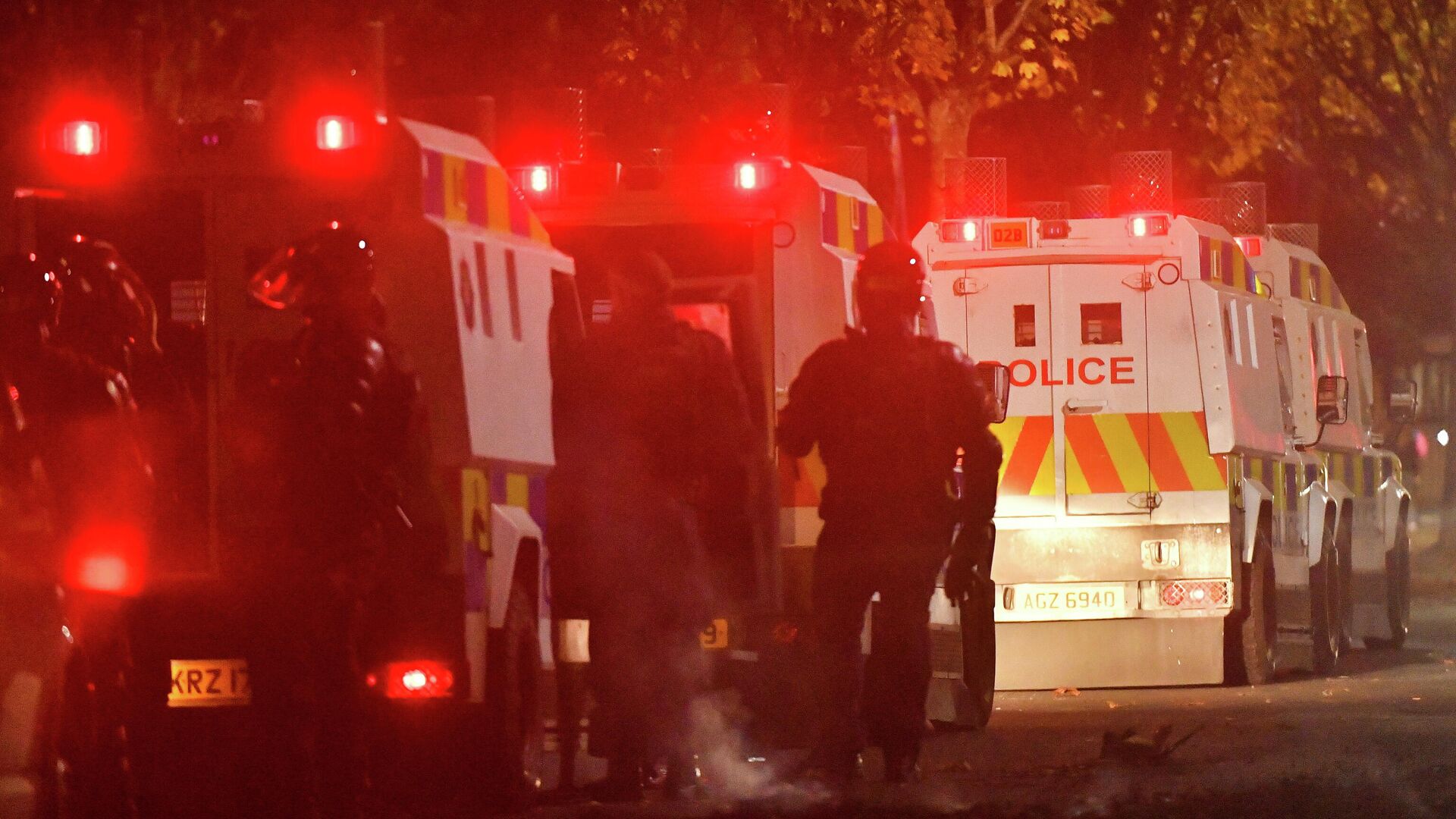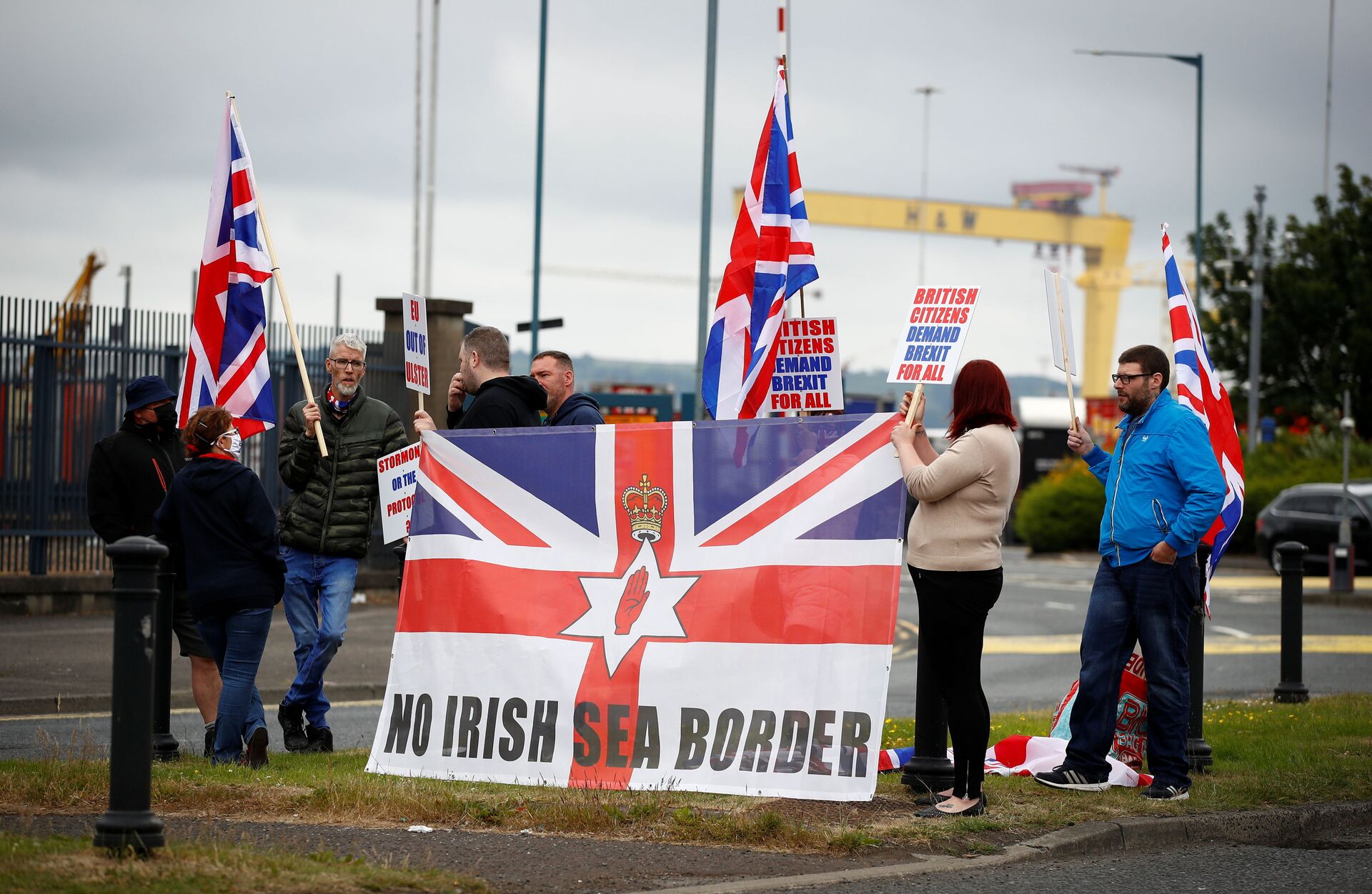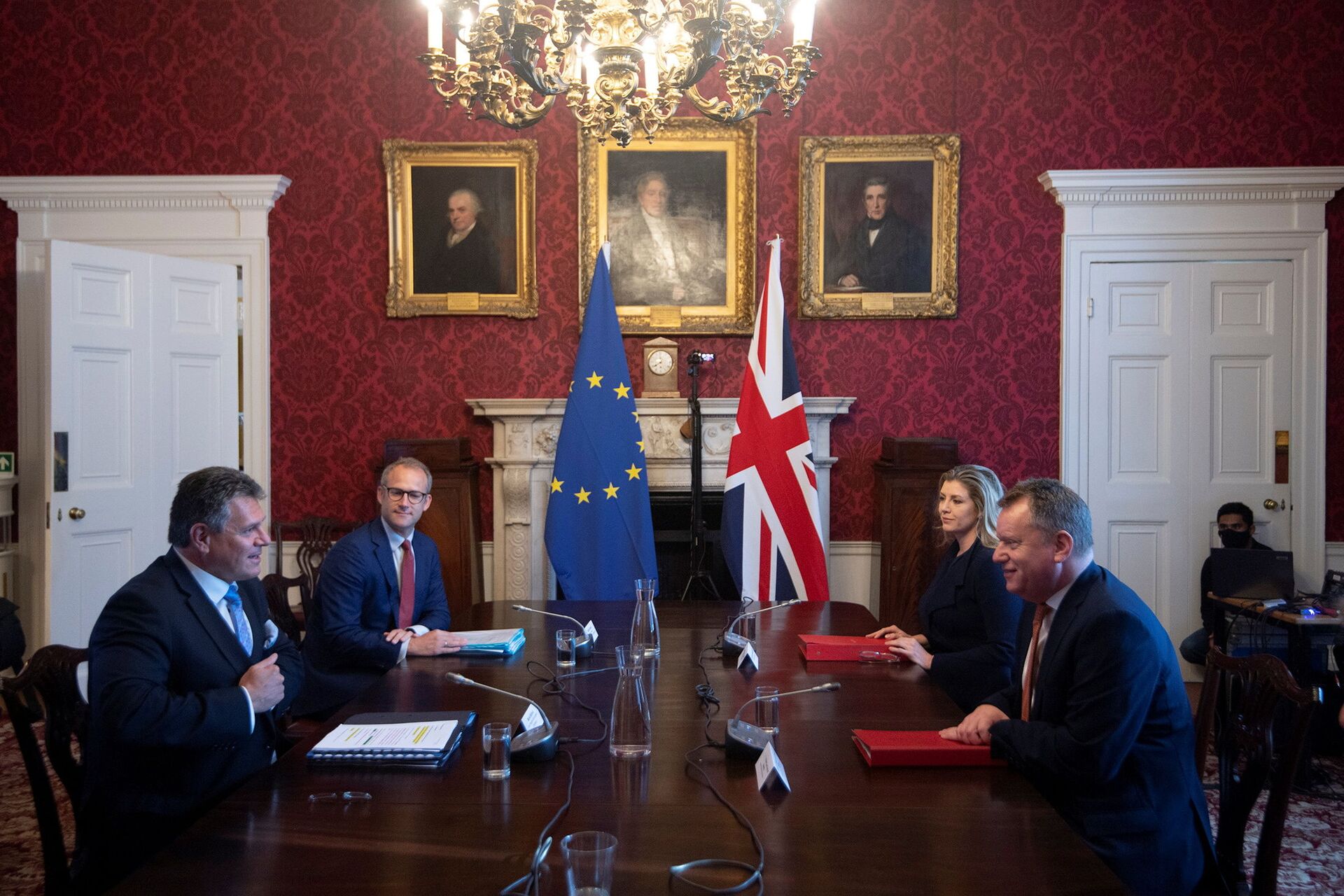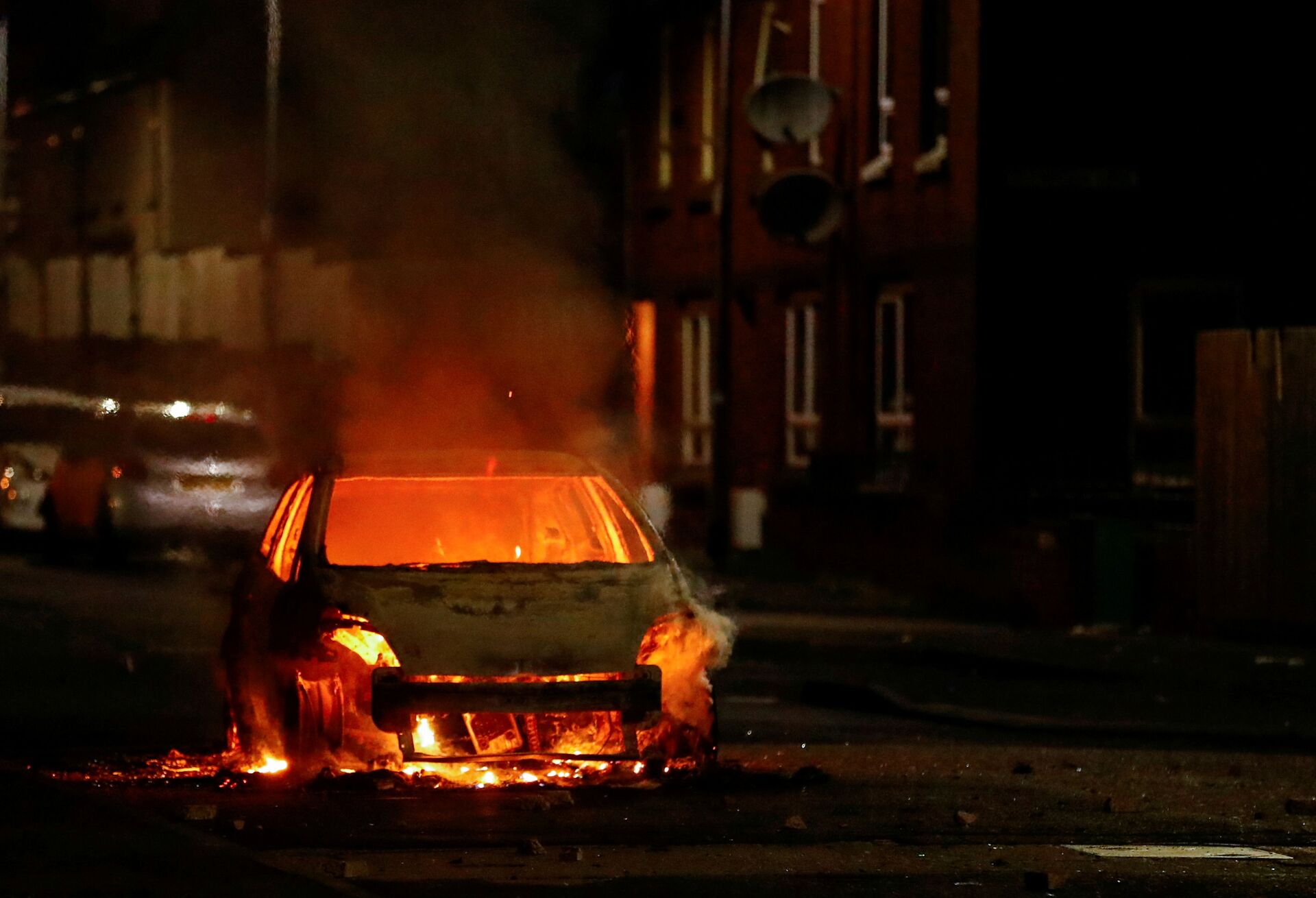https://sputnikglobe.com/20211108/hijacked-bus-set-ablaze-near-belfast-fuels-fears-of-further-ni-protocol-related-post-brexit-1090560188.html
Hijacked Bus Set Ablaze Near Belfast Fuels Fears of Further NI Protocol-Related Post-Brexit Violence
Hijacked Bus Set Ablaze Near Belfast Fuels Fears of Further NI Protocol-Related Post-Brexit Violence
Sputnik International
Disorder has erupted in and around Belfast in an apparent protest against the Northern Ireland Protocol, the Brexit deal which prevents a hard Irish border by... 08.11.2021, Sputnik International
2021-11-08T09:24+0000
2021-11-08T09:24+0000
2023-05-28T15:16+0000
belfast
northern ireland
brexit
post-brexit
northern ireland protocol
maros sefcovic
david frost
united kingdom (uk)
https://cdn1.img.sputnikglobe.com/img/07e5/0b/08/1090560127_0:295:3072:2023_1920x0_80_0_0_36cc9f84b651fcc07df4b4fabc746a6b.jpg
A double-decker bus was hijacked and set on fire on the outskirts of Belfast late on 7 November. The attack took place close to a loyalist estate, near Rathcoole, in Newtownabbey, Co Antrim just before 8pm. The driver and passengers were reportedly ordered off the bus by four masked men, who boarded it in Church Road. The vehicle was then set alight, with the footage of the fire shared online by Nichola Mallon, a politician from Northern Ireland serving as Deputy Leader of the Social Democratic and Labour Party (SDLP) and infrastructure minister. The Irish minister condemned the “disgraceful and disgusting” attack – the fourth of its kind this year – and underscored that the criminals behind them “harm their local community”. A police spokesperson was cited by UK media as confirming that Church Road had been closed, with members of the public requested to avoid the area. The latest violence comes six days after another bus was burnt by masked men in a loyalist area of Newtownards, County Down. The hijacking happened in Abbot Drive at about 06:30 GMT on 1 November. It was reported that the two masked men implicated had "muttered something about the protocol" during the attack, in a reference to the contentious issue of the Northern Ireland Protocol. The infrastructure minister deplored what she said was the third attack on public transport in recent months, as she called upon those involved to "wise up".The incident followed last week’s disorders at a community interface in west Belfast between youths from the nationalist Springfield Road and loyalist Shankill Road, where police were attacked with fireworks on Wednesday and Friday in protest against the Northern Ireland Protocol. Responding to the bus attacks, Mike Nesbitt, Ulster Unionist Party (UUP) Member of Northern Ireland's Legislative Assembly, said that "if this was meant to be some kind of protest against the NI Protocol then it is entirely counterproductive". According to him, there is "absolutely no justification for the attack". UK-EU Stalemate Over NI ProtocolThe violent developments follow weeks of talks that have failed to end the impasse between the UK and the EU over their Brexit-related trade disputes linked with the NI protocol. Amid the standoff, Britain was reportedly considering triggering Article 16 to unilaterally impose "safeguard" measures, which would see the suspension of some rules required in the Brexit Withdrawal deal struck in October 2019 and which came into force in January this year. Following talks in London with Britain's Brexit minister Lord Frost, who underscored that the threat of invoking the Article remained "on the table" and time was running out for Brussels to dodge that outcome, European Commission vice president Maros Sefcovic warned British authorities of "serious consequences". The protocol states that Article 16 can be used in the event of “serious economic, societal or environmental difficulties that are liable to persist”. The Northern Ireland Protocol, part of the European Union and United Kingdom's Brexit agreement, was designed to prevent a hard border on the island of Ireland. It prevents checks on goods coming from Northern Ireland (part of the UK) into the Republic of Ireland (part of the EU) in a bid to preserve the 1998 Good Friday Agreement, which had finally ended decades of sectarian violence that Ireland had been mired in. However, Northern Ireland, accordingly, must follow the rules of the EU's single market, resulting in checks on certain goods coming in from England, Scotland and Wales. This has prompted protests from unionists in Northern Ireland, who argue the protocol weakens ties with the rest of the UK. Invoking Article 16, which could suspend customs checks across the Irish Sea is seen by Brussels as potentially threatening the European Single Market, in a move prompting retaliatory consequences. A senior EU diplomat was cited by The Telegraph as warning:
belfast
northern ireland
united kingdom (uk)
Sputnik International
feedback@sputniknews.com
+74956456601
MIA „Rossiya Segodnya“
2021
News
en_EN
Sputnik International
feedback@sputniknews.com
+74956456601
MIA „Rossiya Segodnya“
Sputnik International
feedback@sputniknews.com
+74956456601
MIA „Rossiya Segodnya“
belfast, northern ireland, brexit, post-brexit, northern ireland protocol, maros sefcovic, david frost, united kingdom (uk)
belfast, northern ireland, brexit, post-brexit, northern ireland protocol, maros sefcovic, david frost, united kingdom (uk)
Hijacked Bus Set Ablaze Near Belfast Fuels Fears of Further NI Protocol-Related Post-Brexit Violence
09:24 GMT 08.11.2021 (Updated: 15:16 GMT 28.05.2023) Disorder has erupted in and around Belfast in an apparent protest against the Northern Ireland Protocol, the Brexit deal which prevents a hard Irish border by keeping Northern Ireland inside the EU's goods market but creates a trade border between Northern Ireland and the rest of the UK, triggering fears of new, Brexit-related violence.
A double-decker bus was hijacked and set on fire on the outskirts of
Belfast late on 7 November. The attack took place close to a loyalist estate, near Rathcoole, in Newtownabbey, Co Antrim just before 8pm. The driver and passengers were reportedly ordered off the bus by four masked men, who boarded it in Church Road.
The vehicle was then set alight, with the footage of the fire shared online by Nichola Mallon, a politician from Northern Ireland serving as Deputy Leader of the Social Democratic and Labour Party (SDLP) and infrastructure minister.
The Irish minister condemned the “disgraceful and disgusting” attack – the fourth of its kind this year – and underscored that the criminals behind them “harm their local community”.
A police spokesperson was cited by UK media as confirming that Church Road had been closed, with members of the public requested to avoid the area.
The latest violence comes six days after
another bus was burnt by masked men in a loyalist area of Newtownards, County Down. The hijacking happened in Abbot Drive at about 06:30 GMT on 1 November. It was reported that the two masked men implicated had "muttered something about the protocol" during the attack, in a reference to the contentious issue of the Northern Ireland Protocol.
"There were no passengers on board when this disgraceful attack occurred, however our driver is badly shaken and is currently being supported by colleagues," Translink's chief executive Chris Conway was cited as saying.
The infrastructure minister deplored what she said was the third attack on public transport in recent months, as she called upon those involved to "wise up".
"You've done nothing in terms of the protocol. All you have done is threaten and intimidate and terrify a bus driver who is a father, a brother, and deprived your own community of a critical bus service,” Mallon said on BBC Radio Ulster's Stephen Nolan Show.
The incident followed last week’s disorders at a community interface in west Belfast between youths from the nationalist Springfield Road and loyalist Shankill Road, where police were attacked with fireworks on Wednesday and Friday in protest against the
Northern Ireland Protocol. Responding to the bus attacks, Mike Nesbitt, Ulster Unionist Party (UUP) Member of Northern Ireland's Legislative Assembly, said that "if this was meant to be some kind of protest against the NI Protocol then it is entirely counterproductive". According to him, there is "absolutely no justification for the attack".
UK-EU Stalemate Over NI Protocol
The violent developments follow weeks of talks that have failed to end the impasse between the UK and the EU over their
Brexit-related trade disputes linked with the NI protocol.
Amid the standoff, Britain was reportedly considering triggering Article 16 to unilaterally impose "safeguard" measures, which would see the suspension of some rules required in the Brexit Withdrawal deal struck in October 2019 and which came into force in January this year.
Following talks in London with Britain's Brexit minister Lord Frost, who underscored that the threat of invoking the Article remained "on the table" and time was running out for Brussels to dodge that outcome, European Commission vice president Maros Sefcovic warned British authorities of "serious consequences".
The protocol states that Article 16 can be used in the event of “serious economic, societal or environmental difficulties that are liable to persist”. The Northern Ireland Protocol, part of the European Union and United Kingdom's Brexit agreement, was designed to prevent a hard border on the island of Ireland.
It prevents checks on goods coming from Northern Ireland (part of the UK) into the Republic of Ireland (part of the EU) in a bid to preserve the 1998 Good Friday Agreement, which had finally ended decades of sectarian violence that Ireland had been mired in.
However, Northern Ireland, accordingly, must follow the rules of the EU's single market, resulting in checks on certain goods coming in from England, Scotland and Wales. This has prompted protests from unionists in Northern Ireland, who argue the protocol weakens ties with the rest of the UK. Invoking Article 16, which could suspend customs checks across the Irish Sea is seen by Brussels as potentially threatening the European Single Market, in a move prompting retaliatory consequences.
A senior EU diplomat was cited by The Telegraph as warning:
"EU capitals like Berlin, Amsterdam, Copenhagen and Paris would expect a robust response. We are ready for peace but prepared for war."




